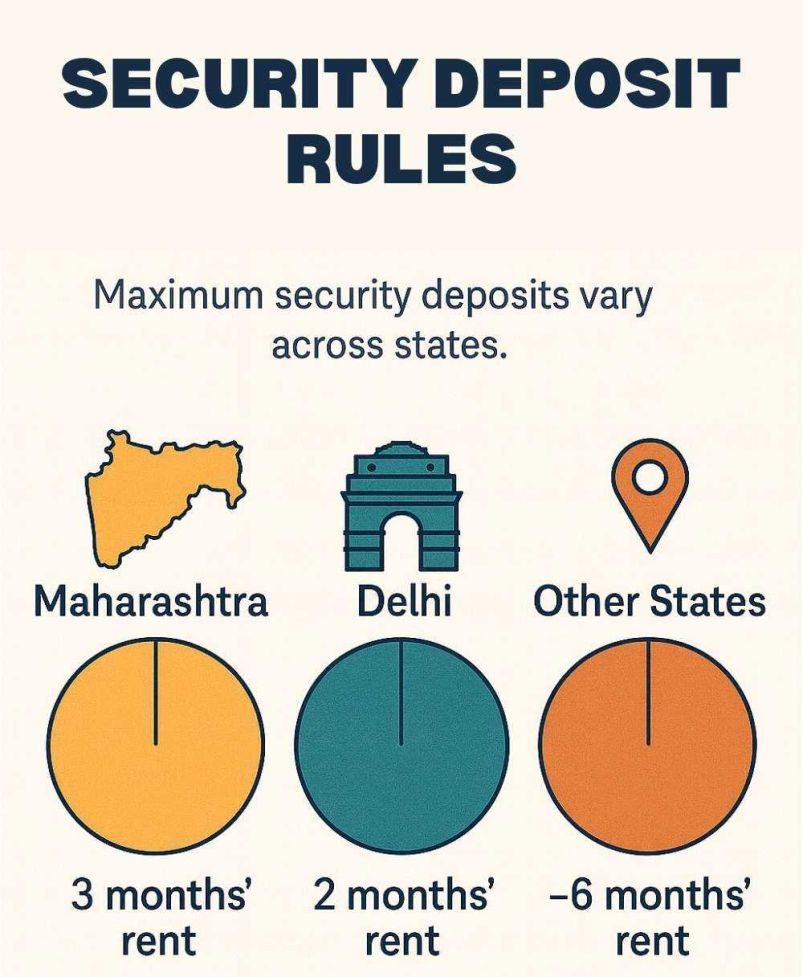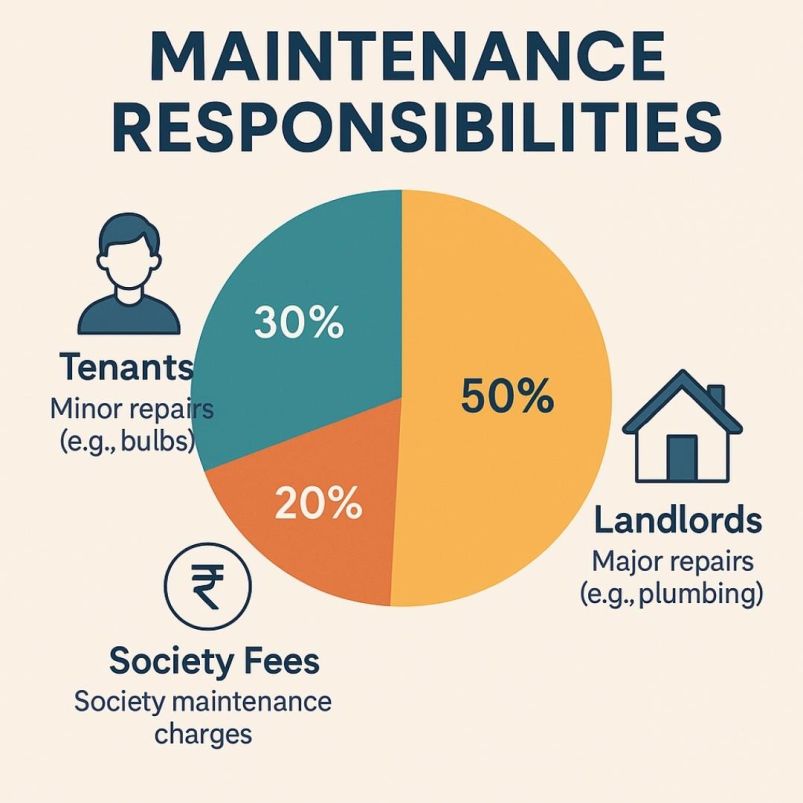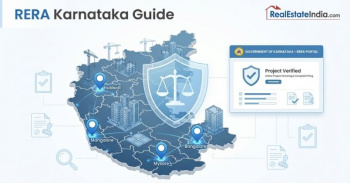What is a Rent Agreement?
A rent agreement in India is a legal contract that is signed between a landlord and a tenant. Who is governing tenancy terms like rent, duration and responsibilities.
This agreement includes details of the property, payment schedules and rules. This is why, by stating all the details, this agreement ensures transparency. Along with this, it is typically set for an 11-month lease clause in India to avoid mandatory registration. Plus, it can be renewed as well if both the landlord and the tenant agree on it. Besides this, a well-drafted agreement minimizes disputes by clarifying maintenance, eviction and mentioning the usage terms also.
In India, registering agreements over 11 months ensures legal enforceability. This document protects both parties' rights and establishes a fair landlord-tenant relationship. Thus, clear clauses are crucial because vague terms can lead to conflicts. In this way, agreement plays a significant role in a smooth rental process.
What is the Importance of a Rent Agreement for Tenants and Landlords?
A rent agreement is simply a document that establishes the regulations between the tenant and landlord. It helps each side know their rights and responsibilities. Thus, letting the rental process run smoothly and fairly. So, let's see how this agreement is beneficial for tenants and landlords:
Benefits for Tenants
A rent agreement benefits tenants in the following ways:
- Legal Protection: A rental agreement offers security to tenants as it is stated clearly regarding the rent, terms, and time. Without consultation between the sides, the landlord cannot alter them.
- Accountable Roles: There would be no misunderstanding in regards to what the tenants should be doing, such what should be done on paying rents on time, maintenance of the property, payment of utility bills, etc.
- Stable Stay: The contract makes it possible to provide a stable stay so that tenants are not evicted suddenly by the landlord as long as they obey regulations.
- Deposit Clarity: It states the deposit to be paid at and the conditions of recovery of the same, thus the tenants are not defrauded of their money.
Benefits for Landlords
There are several ways in which a rent agreement benefits landlords. These include:
- Better Backup: A rent agreement serves as a better backup, whereby when there is some problem, i.e., unpaid rent or even other damage to the property, then landlords have a legal document to prove their point.
- Property Care: The deal also holds the tenants responsible for maintaining the property in fine shape, safeguarding the investment of the landlord.
- Fixed Rent: This standardizes the rent and can have provisions on how future increments are to be made, thus allowing landlords to plan their returns.
- Cleared Eviction Policies: The agreement will set policies on eviction, and therefore, the landlords can follow through in case tenants violate the contractual terms.
Common Types of Rent Agreements in the Indian Rental Market
In India, there are three major types of rent agreements that may be applied by landlords and tenants. They are all unique and have their purposes and rules. Let's have a look at these three primary types of rental agreements:
1. Rent Agreement
A rent agreement is a basic contract that enables a tenant to occupy a property temporarily.
Duration: It normally takes 11 months and is subsequently renewable. When it exceeds 11 months, it has to be registered by law if it is longer.
Key Features:
- Comprises information such as the names of the landlord and the tenant, the amount being charged as rent, description of the property, security deposit, late charges, maintenance responsibilities, parking, and facilities.
- This agreement is designed to be simple and easy to understand.
- In case of an 11-month or less agreement, registration is optional.
2. Lease Agreement
A lease agreement is a written contract for a longer-term stay, most typically over one year, and is bound by the rent control laws of the state.
Duration: Tends to run over 12 months.
Key Features:
- Enables the tenants to use the property within the agreed period, even in the event of the sale of the property to another party.
- It may be prolonged indefinitely.
- Both the landlord and the tenant are required to comply with the conditions of the lease period altogether.
- Should become registered to be legal.
3. Leave and Licence Agreement
This contract allows a tenant to occupy premises without the actual formation of a landlord-tenant relationship.
Duration: It is negotiable, between what the two parties decide.
Key Features:
- Does not provide tenants with any rights with regard to ownership of property.
- The landlord is free to terminate the deal at any time.
- Only a granting of the right to use the property and not deep-seated rights.
- Makes the eviction easy, as it is not a formal tenancy.
Importance of Rent Agreement Clauses
Rent agreement clauses define rights and obligations. This ultimately prevents misunderstandings and ensures legal protection in a rent agreement in India. For tenants, they secure rent, a security deposit clause and tenure that prevents unplanned or unpredictable evictions. For landlords, they safeguard property, ensure timely payments and clarify eviction terms. Besides this, Clauses on maintenance, utilities, and subletting restrictions reduce disputes. Model Tenancy Act rent clauses align with modern laws and promote fairness for both parties. Since the Recent social media posts raise the concern that tenants overlook fine print, risking disputes over break-lease exit terms in India. This even raises the importance of the rental agreement clause. Plus, a registered rental lease agreement with strong clauses ensures transparency and protects both parties in India's evolving rental market.
What are the Key Points of Rent Agreement Clauses?
Here are some important clauses that must be included in a rental agreement. Also, both landlord and tenant must agree to these clauses.
1. Tenant and Landlord Details
Firstly, in a clause, the proper details of both the landlord and the tenant should be mentioned. This includes full names, addresses, and contact details, with Aadhaar or PAN for police verification, and a rent agreement. As the accurate details of both parties ensure accountability and prevent legal issues. Especially if there is an NRI landlord rent agreement guide scenario going on.
2. Property Description
Then it must specify the property's address, mention the type, whether it is a 2 BHK apartment or 3BHK, etc. With that, also mention the size i.e, 900 sq ft), and facilities (e.g., whether there is a parking or gym. Besides this, a small mention of the furnishings is made to avoid confusion in the rent agreement in India.
3. Rent Amount and Payment Terms
Then in the clause, there is a mention of the detailed monthly rent (e.g., ₹45,000), due date (e.g., 5th), and payment mode (e.g., bank transfer). This gives more clarity for both the landlord and tenant. Along with this, also include penalties that are imposed for late payments (e.g., 2% interest per week) and a grace period. All this aligns with the Model Tenancy Act rent clauses for clarity.
4. Security Deposit Clause
Then in the clause, state the deposit amount (e.g., 2–10 months' rent), purpose (e.g., damages), and refund conditions (e.g., within 30 days post-tenancy, minus repairs). Plus, in different states, different security deposits are imposed. For example, in Maharashtra, deposits are capped at three months' rent; in Delhi, two months. This prevents refund disputes.
5. Agreement Tenure
Also, in agreement, tenure defines the duration, which is typically an 11-month agreement, with renewal terms. Then also mention the Specify mutual consent for extensions, if both agree on the same. This ensures clarity in the rental lease agreement.
6. Maintenance and Repairs
Then, priorly to and uploudly maintain the clarity on responsibilities: i.e., tenants handle minor repairs (e.g., light bulbs), landlords cover major repairs (e.g., plumbing). Also, along with this, specify society maintenance fees (e.g., ₹2,000/month) to avoid conflicts.
7. Subletting Restrictions Clause
Then prohibit subletting without consent, restrict commercial use, and outline pet policies if pets are allowed or not. Discuss it priorly to (e.g., small pets with approval). With this, also include visitor guidelines to protect property use.
8. Break-Lease Exit Terms India
Then, in the clause, there is mention of the detailed termination grounds (e.g., non-payment) and notice period (e.g., 30 days or more). With this, also include a lock-in period (e.g., 6 months) to prevent early exits without penalties. This ultimately ensures fairness for both parties.
9. Landlord's Access
Importantly, the specific time allotted for inspection should be mentioned in the clause. Such as specifying inspection times that should be given with a 24-hour notice to balance tenant privacy and property monitoring. This reduces further conflicts in the rent agreement.
10. Dispute Resolution Clause
Also, in the clause, mention that there are Outline mediation or arbitration processes for disputes. This should align with the Model Tenancy Act rent clauses. With that, it includes state-wise rent agreement stamp duty details (e.g., 2% of annual rent in Delhi) for legal validity.
11. Tenant Insurance Clause Rent Agreement
Plus, the clause also includes a requirement for tenants to maintain insurance for personal belongings or damages. This is often added in the rent agreement clause for added protection, especially for high-value properties, where there is a greater chance of damage.
Recent News and Discussions on Rent Agreement Clauses
In July 2025, Social media posts, including a July 22 tweet by @bsindia, highlight tenants signing rent agreements in India without reading the fine print, regretting disputes over break-lease exit terms in India or security deposit clause by facing penalties like ₹75,000 for lock-in periods. This is why tenants regret overlooked rent agreement clauses, like lock-in periods, costing thousands. This further emphasizes police verification of the entire rent agreement clauses.
Along with this, courts clarified rent payments don't imply property sale, stressing precise rent agreement clauses. Plus, these trends underscore the importance of clear and important clauses in a rental agreement, like a subletting restrictions clause and a tenant insurance clause in a rental agreement. This raises the importance of rent agreements.
Common Mistakes to Avoid in Rent Agreement Clauses
By avoiding common mistakes in rent agreement clauses, you can create a fair and legally sound contract. Let's see how:
- Vague Terms: If there is an unclear security deposit clause or maintenance terms, they can spark disputes between the landlord and tenant. So, it is mandatory to specify details to avoid disputes.
- Missing Details: Plus, incomplete or Incorrect names or property specifics cause issues. With this, it also hinders the process of verifying information.
- No Rent Escalation Clause India: If priorly to the clause, there is no mention of increment, or if there is an omission at the time of clause making. This will lead to conflicts.
- Unclear Break-Lease Exit Terms India: If there is no clear specification of deductions, there may be chances of disputes between both parties.
- Ignoring Subletting Restrictions Clause: If there are unaddressed subletting leads to unauthorized use of the property. This will lead to further complications in the agreement.
- Skipping Registration: Plus, omitting state-wise rent agreement stamp duty reduces enforceability, and this will be one of the common mistakes to avoid in the rent agreement clause.
- No Dispute Resolution Clause: If there is an unclear conflict resolution, it will complicate further disputes. Due to which Tenants and landlords risk financial loss without precise rent agreement clauses.
Rent Escalation Clause in India and Penalties
Model Tenancy Act rent clauses prohibit rent hikes during the agreement term (e.g., an 11-month lease clause in India). With that, the post-expiration, India allows a rent escalation clause. Thus, India allows up to a 10% increase with three months' notice.
Although the unregistered agreements over 11 months don't permit legal hikes, as per the Karnataka High Court. Talking about the late rent penalties, which include double rent for two months, then four times thereafter. This is why clear rent agreement clauses prevent disputes.
What are the Requirements for Rent Agreement Registration?
Agreements over 11 months require registration with Aadhaar, two passport-sized photos, and identity proof (e.g., voter ID). With that, the State-wise rent agreement stamp duty (e.g., 2% of annual rent in Delhi) is paid via stamp paper or digital rental agreement e-stamping in states like Maharashtra. This is important because registration ensures enforceability. Whereas, unregistered agreements lack court validity. Thus, verifying rent agreement clauses during registration prevents fraud, especially for NRI landlord-tenant agreements.
Conclusion
It is crucial that both landlords and tenants get to know the importance of having clauses in the rent agreement in India. All tenants and landlords who desire a hassle-free and legal process find that the clause plays an important role. The agreement has these clauses as its core, with rights and duties of both parties being spelled out. Therefore, it avoids conflict interpretation because it is well written and registered.
Amid the Model Tenancy Act changing the face of rental in India it is essential to keep track of legislation. Thus, with the help of carefully drafted comprehensive clauses, as discussed in this guide, landlords and tenants can protect their interests. With that, also develop a transparent, mutually beneficial rental relationship. By ensuring clarity in these clauses both parties can create trust between them and minimize disputes. Along with that, a well-structured agreement ultimately promotes a harmonious and legally sound tenancy experience.
Common Questions Asked About Rent Agreement
- What key clauses ensure a rent agreement is clear and legally protective?
To include names and addresses of the landlord and the tenant, the tenancy term. Plus, there are the sum of the rent and security deposit, the restrictions, the termination terms, the renewal terms, as well as maintenance responsibilities. So that they are clear and there is a legal protective guard
- How can rent agreement clauses be drafted to avoid disputes?
Be specific, clear on the definition of rights and obligations and limits (e.g., sublets are prohibited, pets are encouraged/discouraged) such that both parties have a clear picture of their obligations, hence minimal conflict risks.
- How does the Model Tenancy Act shape rent agreement clauses in India?
Model Tenancy Act has explicit provisions on rents, security deposits, maintenance and termination to make them compliant, transparent and bring in equilibrium of rights between landlords and tenants
- How do clauses differ in registered vs. unregistered rent agreements?
Registered contracts, which are deposited with the sub-registrar, are enforceable under the law; unregistered contracts. Those that are signed by the lawyers may not be enforceable, but still describe similar provisions, such as rent and duties
- What clauses clarify maintenance and repair responsibilities in a rental agreement?
Clauses must make clear whether landlords are responsible for major repairs (e.g., structural damage). While Tenants deal with minor maintenance (e.g., light bulbs) and state who is responsible for the associated expenses.










ADD COMMENT